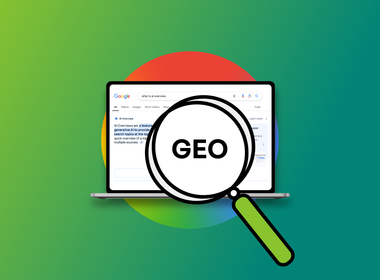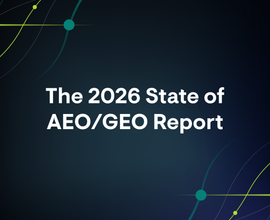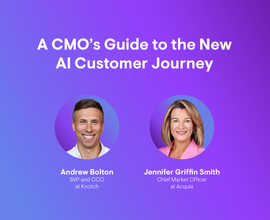What is Generative Engine Optimization (GEO)?
What is Generative Engine Optimization (GEO)?
Generative Engine Optimization (GEO) is the process of strategically creating and refining your website content so that answer engines and AI chatbots can effectively understand, surface, and present it to users. It’s a natural evolution of SEO, as users increasingly get direct answers from AI, rather than combing through a list of links. The goal is to ensure your brand is visible and accurately represented when AI systems generate responses to relevant user queries. Similar to answer engines, some examples of generative engines include ChatGPT , Google's Gemini , and Perplexity .
GEO goes beyond traditional keywordKeyword
A keyword is what users write into a search engine when they want to find something specific.
Learn more focus. It’s about making your content "AI-friendly" not just for discoverability, but for direct integration into AI-generated outputs. That means structuring your content for clarity, ensuring factual accuracy, and highlighting unique insights that an AI can recognize as valuable.
As generative AI becomes more popular among users, ultimately, GEO is about maintaining visibility and relevance in an AI-driven information ecosystem, ensuring your expertise is part of the conversation, even when that conversation is mediated by a generative engine.
GEO vs. SEO: What's the difference?
While both generative engine optimization (GEO)Generative Engine Optimization (GEO)
GEO is the process of optimizing content to increase visibility and citations within AI-powered search experiences like AI Overviews and LLMs.
Learn more and search engineSearch Engine
A search engine is a website through which users can search internet content.
Learn more optimization (SEO) aim to increase visibility and connect users with relevant information, SEO has traditionally focused on optimizing content (websites, articles, images) to rank highly in the results pages of search engines like Google or Bing. The primary goal is to drive traffic to your own web properties by appearing in the list of links.
A lot of times, with these acronyms, people are trying to define what an optimization practice is. A term was coined a very long time ago that was search everywhere optimization. For the last 25, 30 years, search just happened on Google 90% of the time, but now that's diversifying, and search everywhere optimization is really happening.
GEO, on the other hand, focuses on optimizing your content and information to be favorably interpreted and used by generative AI models and answer engines. Instead of just aiming for users to click through your website, GEO seeks to have your information directly inform or be cited within the AI's generated response. It's about influencing the output of the generative engine itself.
Here are some core differences:
- Target Engine:
- SEO: Targets traditional search engine algorithms (e.g., Google's PageRank, keyword matching)
- GEO: Targets generative AI models and answer engines (e.g., LLMs, AI chatbots)
- Primary Goal:
- SEO: Higher ranking in search results, leading to website traffic
- GEO: Favorable representation and citation within AI-generated answers and content
- Content Focus:
- SEO: Keywords, backlinks, site structure, user experience, on-page
- GEO: Clarity of information, factual accuracy, data structure, authoritativeness for AI interpretation, and direct answerability
- Output:
- SEO: A list of links to various web pages
- GEO: A synthesized, direct answer or newly generated content from the AI
SEO generally refers to content and website optimization strategies that help a website rank well in Google’s search results.
GEO is really about how you optimize your content and create a different strategy for content creation and optimization, specifically under the umbrella of these AI search engines or LLM answer engines.
While distinct, GEO and SEO are not necessarily mutually exclusive and will likely become increasingly intertwined as search engines integrate more generative AI features.
Why is GEO important?
As generative AI technologies become the dominant way that users access and interact with information, GEO is only getting more important. Traditional SEO strategies alone aren't enough to ensure that your brands is visible in a landscape where users expect instant, AI-generated answers instead of lengthy search results pages. GEO ensures that your expertise and brand messaging don't get lost or misrepresented as LLMs and answer engines like ChatGPT, Gemini, and Perplexity generate responses from multiple data sources, often without direct citations or mentions. The key to optimizing for generative search is prioritizing clarity, reliability, and accuracy within your content. GEO helps to position your brand as a trustworthy resource that AI tools will favor when assembling their answers.
Examples of GEO strategies
In an AI world flooded with different optimization acronyms, it can be easy to get confused. But GEO and AEO deal with the same core concept, which is implementing strategies that improve your visibility in AI-powered search. Are there some nuances between the two? Sure. But in general, it’s like the difference between optimizing for Google and for Bing. There isn’t one. Your AEO strategies will help with your GEO goals and vice versa. With that in mind, check out our article on AEO that dives deeper into some actionable AEO strategies you can employ to ensure your brand’s visibility as AI evolves.
FAQs
- What is an answer engine?
- What is answer engine optimization (AEO)?
- What is AI optimization (AIO)?
- What is AI Mode?
- How does GEO impact your holiday SEO strategy?

![Patrick Reinhart, VP, Services and Thought Leadership, [object Object]](https://cdn.sanity.io/images/tkl0o0xu/production/9bc72298b24ad01b732de4c3376f79546d20f81c-3542x3542.png?fit=min&w=100&h=100&dpr=1&q=95)
![Wei Zheng, Chief Product Officer, [object Object]](https://cdn.sanity.io/images/tkl0o0xu/production/dcfa62c0fe34ba0c31f910b818874cd160ad8839-3542x3542.png?fit=min&w=100&h=100&dpr=1&q=95)






